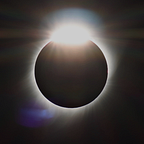Wormholes and Exotic matter
Sometimes exploring magical phenomena that aren’t proven yet can be more enchanting than merely thinking about them. One of the strange phenomena in the universe is wormholes. If you saw wormholes in reality, it would appear round, spherical, a bit like a black hole. But are wormholes real or are they just disguised as physics and maths? If they are real, how do they work and where can we find them? To answer that type of question, we need to understand it and experience the feeling of being in a wormhole. Luckily, I’m here to help you explore that sensation.
Our universe is like a big flat sheet, imagine it bent in just the right way, that could connect two very, very distant spots with a short bridge that you could cross almost instantaneously, and this is a wormhole, to be precise. Enabling you to travel faster than the speed of light. So, where could we find them? Well, presently on paper. They are theoretically possible and there are different kinds.
Einstein-Rosen Bridge
The first kind of wormholes to be theorized were the Einstein-Rosen bridges. They describe every black hole as a sort of portal to an infinite parallel universe. Imagine a flat space-time sheet curved by objects on it. If we compress that object, space-time gets more curved around it. Eventually, space-time becomes so warped it has no choice but to collapse into a black hole. A one-way barrier form: the event horizon that anything can enter but can’t escape trapped forever at the singularity at its core.
The theory suggested that maybe there is another mirrored upside-down universe where time runs backward. In our universe things fall into the black hole and spew out by mirror universe black hole, a bit like a big bang. This is called a white hole. Unfortunately, the Einstein-Rosen bridge can’t actually be crossed. It takes an infinite amount of time to cross over to the opposite universe and they crimp shut in the middle. If you go into a black hole, you won’t become the stuff coming out of the white hole. You’ll only become dead as it takes infinite time to travel.
Don’t lose hope just yet if we want to travel through a wormhole, we have to make it traversable and useful. There are a few properties we want to have a wormhole.
Man Made Wormhole
First, it must connect to distant parts of space-time like Earth to Jupiter. Second, it should not have any event horizons, which block two-way travel. Third, it should be sufficiently sized so that the gravitational forces don’t kill the traveler. The biggest problem we have to solve is keeping our wormholes open. No matter how we make wormholes, gravity tries to close them. Gravity wants to pinch it closed and cut the bridge; leaving only black holes at the ends unless we have something propping it open. For very old string theory wormholes, that’s the cosmic string job. For man-made wormholes, we need a new ingredient known as exotic matter.
Exotic matter
This isn’t anything like we find on Earth, or even antimatter. It’s something new and different and exciting, with crazy properties like nothing that’s ever been seen before. Exotic matter is a stuff that has a negative mass. Like positive masses attractive towards each other due to gravity, exotic matter has a repulsive nature due to its negative mass. This creates a kind of anti-gravity the props opens the wormholes.
Well, the Earth could be a wormhole hub for a vast interstellar human civilization spread over light-years, but only a wormhole away.
However, wormholes have a dark side. Even opening a single wormhole, kind of breaks the universe in fundamental ways, potentially creating a time travel paradox and violating the causal structure of the universe. It means that they should not only be impossible to make but that it’s impossible for them to exist at all. But don’t be sad, as Stephen Hawking once said…
The universe doesn’t allow perfection.
_Stephen Hawking_
